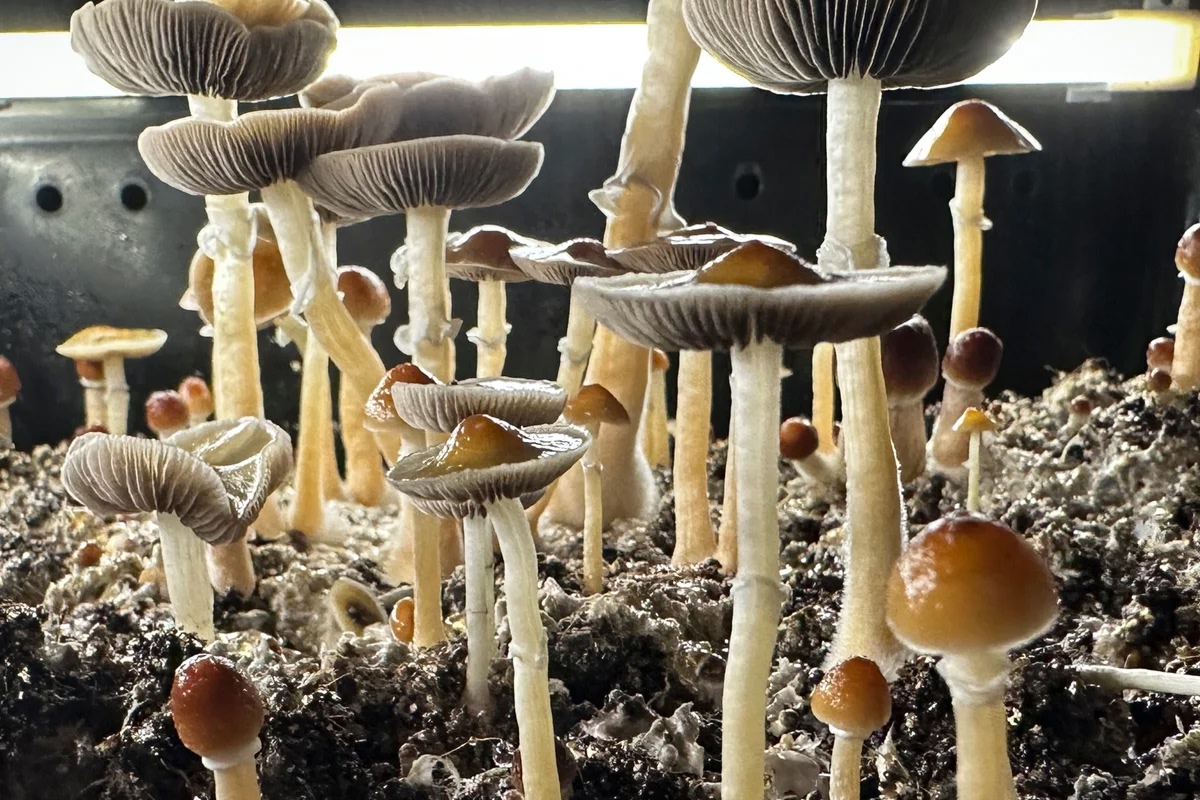Key Takeaways
- Shrooms affect both the brain and body, altering serotonin levels and creating unpredictable physical and psychological effects.
- Unsupervised use of shrooms can trigger or worsen mental health conditions, including anxiety, psychosis, and depression.
- 12 South Recovery provides professional addiction treatment for those struggling with the effects of psychedelic drugs and substance abuse.
For decades, shrooms have been surrounded by fascination and controversy. Some people view them as harmless hallucinogens used for spiritual or creative experiences. Others have seen the darker side. Mental health issues, dangerous behavior, and lasting brain changes.
At 12 South Recovery, we believe knowledge is a powerful prevention tool. Knowing what shrooms do to your brain and body can help you make informed choices and recognize when treatment for psychedelic drugs is necessary.
What are Shrooms
Shrooms, also known as magic mushrooms, are a type of psychedelic drug that contain psilocybin and psilocin. These are two naturally occurring hallucinogenic compounds. When ingested, these chemicals alter brain function, perception, and mood.
Once taken, psilocybin is converted into psilocin in the body, which binds to serotonin receptors in the brain. This affects communication between neural networks, leading to changes in thinking, emotion, and sensory experience. Users may see vivid colors, experience time distortion, or feel deep emotional shifts.
While often used recreationally, mushrooms are powerful psychoactive substances. The effects can vary depending on dosage, the user’s mindset, and environment. For some, it results in euphoria and introspection. For others, it causes confusion, anxiety, and paranoia.
At 12 South Recovery, our team educates clients about the biological and psychological effects of psychedelic drugs to promote awareness and prevent harm.

What Do Shrooms Do to Your Brain
Shrooms and the Serotonin System
The most direct impact of mushrooms is on the brain’s serotonin system, particularly the 5-HT2A receptors, which influence mood, perception, and cognition. When psilocin binds to these receptors, normal brain communication becomes disrupted, leading to altered thinking and sensory distortion.
The Default Mode Network and “Ego Loss”
Functional MRI studies show that mushrooms decrease activity in the default mode network (DMN), the area of the brain tied to self-reflection and identity. This reduction can cause a sense of “ego loss,” where users feel detached from themselves or reality. While some describe this as enlightening, others experience confusion or fear.
Short-Term and Lasting Psychological Effects
The effects of shrooms typically last four to six hours, but the psychological impact may persist long after. Some individuals experience temporary calm or insight, while others suffer panic attacks, paranoia, or frightening hallucinations.
Long-Term Impact on Brain Chemistry
Repeated use or large doses can alter brain chemistry in ways that resemble psychosis, especially for those with existing mental health disorders. Even one high-dose experience can trigger chronic anxiety, paranoia, or depression in vulnerable individuals.
Professional Support and Recovery
At 12 South Recovery, we treat clients struggling with lingering effects of psychedelic drugs and substance abuse. Our integrated therapies, including CBT, DBT, and holistic practices, help restore healthy brain function and mental clarity.
What Do Shrooms Do to Your Body
Physical Reactions to Shrooms
When shrooms are consumed, psilocybin is absorbed into the bloodstream and affects the central nervous system. Within 30 to 60 minutes, users may experience dilated pupils, increased heart rate, elevated blood pressure, and muscle weakness. These reactions are caused by changes in serotonin and dopamine signaling throughout the body.
Short-Term Bodily Effects
Some people feel relaxed, while others experience nausea, sweating, or vomiting. These physical symptoms are signs that the body is trying to adapt to altered brain activity. Because potency varies from mushroom to mushroom, it’s easy to take an unexpectedly high dose, which can intensify these effects and lead to physical distress.
Toxicity and Overdose Risks
Although psilocybin itself is not typically lethal, accidental ingestion of toxic mushroom species can cause serious poisoning, organ damage, or even death. High doses of psychedelic mushrooms can also result in dehydration, fainting, or panic-induced physical harm.
Why Medical Monitoring Matters
The unpredictability of each reaction makes unsupervised use risky. At 12 South Recovery, our medical and clinical teams educate clients about the body’s response to psychedelic drugs and provide safe, supervised care for those experiencing withdrawal, lingering side effects, or other complications.
Can Mushrooms Affect Mental Health
Yes, mushrooms can affect mental health in both short- and long-term ways. While some studies have explored psilocybin’s potential for controlled therapeutic use under medical guidance, unsupervised use can worsen or trigger psychological conditions.
Individuals with a history of anxiety, depression, bipolar disorder, or psychosis are particularly vulnerable. A single psychedelic drug experience can destabilize mood or trigger a psychotic episode.
Common short-term mental effects include:
- Intense emotional swings
- Panic attacks
- Disorganized thinking
- Hallucinations that feel real
In some cases, people develop hallucinogen persisting perception disorder (HPPD), where visual distortions or flashbacks occur long after using shrooms.
At 12 South Recovery, our addiction treatment and mental health programs work hand-in-hand to help individuals experiencing trauma, mood disorders, or post-hallucinogenic symptoms.
What are the Long Term Side Effects of Mushrooms
While shrooms are often thought of as harmless because they’re plant-based, their long-term effects can be serious. Repeated use can alter the brain’s chemistry, leading to persistent psychological disturbances.
Long-term side effects may include:
- Ongoing anxiety or depression
- Flashbacks or visual disturbances
- Emotional numbness
- Difficulty concentrating
- Impaired memory
- Personality changes
In extreme cases, individuals may develop substance dependency patterns, using shrooms repeatedly to escape emotional distress or reality. This behavioral pattern mirrors other forms of substance abuse and may require structured addiction treatment.
What is Unhealthy About Mushrooms
The primary health risks of mushrooms are neurological and psychological. The chemical psilocin interferes with natural brain signaling, disrupting serotonin regulation, which influences mood, sleep, and impulse control.
Physical toxicity is rare, but emotional instability and perceptual changes are common. Some users experience “bad trips” that involve panic, paranoia, or psychosis. These events can leave emotional scars and, in severe cases, lead to self-harm or unsafe behavior.
Another serious risk comes from misidentification. Many people unknowingly consume poisonous mushrooms that contain toxic compounds, resulting in organ damage or death.
At 12 South Recovery, we educate clients on the risks of hallucinogenic substances and provide immediate addiction treatment for those struggling with psychological aftereffects.
Dangers of Psychedelic Drugs
The dangers of psychedelic drugs extend far beyond a single experience. Substances like LSD, DMT, and psilocybin can cause unpredictable reactions because their effects depend on the user’s brain chemistry and mental state.
Some people develop hallucinogen use disorder, characterized by cravings, increased tolerance, and psychological dependency. Others experience lasting trauma from frightening hallucinations or dissociative states.
These substances can also interact negatively with prescription medications, increasing the risk of seizures, cardiovascular problems, or serotonin syndrome, a potentially fatal condition.
At 12 South Recovery, our medical and clinical teams address both the psychological and physical consequences of psychedelic drug misuse. We guide clients through safe detox and therapeutic stabilization to promote recovery and mental clarity.
When Treatment for Psychedelic Drugs is Necessary
Professional treatment for psychedelic drugs is necessary when use begins to cause harm: physically, emotionally, or socially. Warning signs that indicate a need for treatment include:
- Ongoing anxiety, paranoia, or confusion after using shrooms
- Difficulty separating reality from hallucinations
- Cravings or repeated use despite negative outcomes
- Withdrawal from family, friends, or responsibilities
- Flashbacks or mood swings lasting weeks or months
At 12 South Recovery, we help clients break the cycle of hallucinogen dependence through detox, residential care, PHP, IOP, and continuing care. Our integrated model combines mental health support and addiction recovery, focusing on long-term stability and emotional healing.
Get Psychedelic Drug Treatment at 12 South Recovery
Shrooms can alter how the brain processes information, changing mood, perception, and decision-making. These changes may seem harmless at first but can lead to anxiety, confusion, and long-term mental health issues. Physically, shrooms affect the nervous system, often causing nausea, increased heart rate, and fatigue. Continued use can disrupt both brain chemistry and emotional balance. Call 12 South Recovery today to get professional help for the effects of shrooms and start your path to recovery.































